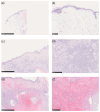Immunohistochemical Expression of Haptoglobin in Skin Lesions of Hidradenitis Suppurativa
- PMID: 40430166
- PMCID: PMC12113320
- DOI: 10.3390/life15050738
Immunohistochemical Expression of Haptoglobin in Skin Lesions of Hidradenitis Suppurativa
Abstract
Background: Meta-inflammation is a hallmark of hidradenitis suppurativa (HS). Research on meta-inflammation in HS is growing, but there is still no research on haptoglobin as an inflammatory protein in lesional HS skin. This study examines the relationship between haptoglobin expression in HS skin lesions and clinical parameters.
Methods: An examination was performed on 44 skin samples from HS patients and 10 healthy skin samples. Clinical parameters were then compared with haptoglobin expression.
Results: Median haptoglobin expression was significantly higher in the Hurley stage III lesions compared with milder stages (H-score: 37.6 versus 17.1, p = 0.028). High haptoglobin expression (≥30.8% positive cells) was associated with advanced disease (Hurley stage III: 80% versus 41.7%, p = 0.01), active smoking (80% versus 50%, p = 0.039), increased pain (visual analogue scale: 5 versus 1.5, p = 0.03), and a higher prevalence of diabetes (35% versus 8.3%, p = 0.029) and hypertension (55% versus 25%, p = 0.042). No significant associations were found with the BMI, disease duration, or CRP levels.
Conclusions: High haptoglobin expression (positive cells ≥ 30.8%) in a skin lesion is associated with higher HS severity, active smoking, more pain and the comorbidities of diabetes mellitus and arterial hypertension in HS patients.
Keywords: HS; diabetes mellitus; haptoglobin; hidradenitis suppurativa; inflammation; meta-inflammation; skin lesion.
Conflict of interest statement
N.A. received funding, travel support, or personal honoraria for lectures from Novartis Pharma, Janssen-Cilag GmbH, Recordati Rare Diseases Germany GmbH, Therakos (UK) Ltd. and Johnson & Johnson that were independent of the work submitted. F.G.B. has received honoraria for participation on advisory boards, in clinical trials, or as a speaker from AbbVie Inc., AbbVie Deutschland GmbH & Co. KG, Acelyrin, Beiersdorf, Boehringer Ingelheim Pharma GmbH & Co. KG, Celltrion, Dr. Wolff, Incyte Corporation, Janssen-Cilag GmbH, Johnson & Johnson, Merck, Mölnlycke, MoonLake, Novartis Pharma GmbH, Sanofi, Sitala and UCB Pharma. E.S. has received lecture fees from Almirall, Leo, Pierre Favre, and Philips. L.O. has received honoraria as a speaker or travel support from Novartis Pharma GmbH, Incyte Biosciences Corporation, and Janssen. T.M. has received honoraria as a speaker from Novartis, Coldplasmatech and Hologic. The other authors (H.T., M.S., D.M., Y.H.) declare no conflicts of interest.
Figures

Similar articles
-
Two Cases of Hidradenitis Suppurativa Treated with Adalimumab at the Department of Dermatology and Venereology, Clinical Hospital Mostar.Acta Dermatovenerol Croat. 2021 Jul;29(2):108-110. Acta Dermatovenerol Croat. 2021. PMID: 34477078
-
Haptoglobin is an independent marker for disease severity and risk for metabolic complications in hidradenitis suppurativa: A prospective study.J Eur Acad Dermatol Venereol. 2024 Jan;38(1):205-213. doi: 10.1111/jdv.19495. Epub 2023 Sep 22. J Eur Acad Dermatol Venereol. 2024. PMID: 37669834
-
Pilot study of topical ruxolitinib demonstrates efficacy and blunting of heterogeneous inflammatory processes in mild hidradenitis suppurativa.Br J Dermatol. 2025 Apr 28;192(5):845-856. doi: 10.1093/bjd/ljae495. Br J Dermatol. 2025. PMID: 39708369 Clinical Trial.
-
Evidence-based approach to the treatment of hidradenitis suppurativa/acne inversa, based on the European guidelines for hidradenitis suppurativa.Rev Endocr Metab Disord. 2016 Sep;17(3):343-351. doi: 10.1007/s11154-016-9328-5. Rev Endocr Metab Disord. 2016. PMID: 26831295 Free PMC article. Review.
-
The Microbiome in Hidradenitis Suppurativa Tunnels: A Systematic Review.Int J Dermatol. 2025 Jun 17. doi: 10.1111/ijd.17892. Online ahead of print. Int J Dermatol. 2025. PMID: 40528662 Review.
References
-
- Kanbay M., Yerlikaya A., Sag A.A., Ortiz A., Kuwabara M., Covic A., Wiecek A., Stenvinkel P., Afsar B. A journey from microenvironment to macroenvironment: The role of metaflammation and epigenetic changes in cardiorenal disease. Clin. Kidney J. 2019;12:861–870. doi: 10.1093/ckj/sfz106. - DOI - PMC - PubMed
LinkOut - more resources
Full Text Sources
Medical
Research Materials
Miscellaneous

